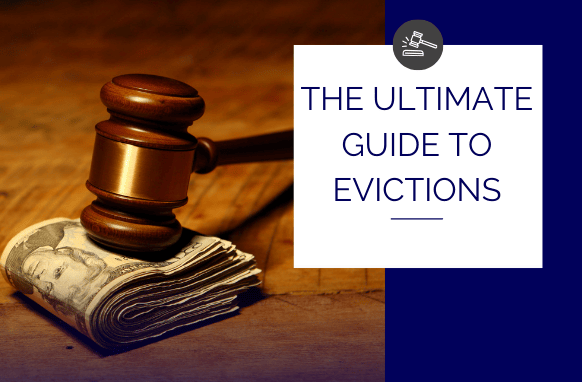Planning for a secure financial future takes foresight, and real estate investments offer excellent tax benefits that can enhance your bottom line. Tax laws are designed to incentivize property investments, but failing to take advantage of available deductions can result in significant lost income over time. Knowing which expenses, you can legally write off on your Virginia investment property ensures that you keep more of your hard-earned money and maximize your returns.

However, real estate investing is a business, and success requires organization and strategic planning. Keeping detailed records and understanding tax regulations can help you avoid unnecessary financial losses. Because tax laws come with complexities and specific eligibility requirements, consulting with a professional tax advisor is always a smart move.
Want more strategies to boost your rental income? Our comprehensive Landlord Guide covers everything you need to know. Download Now!
Passive vs. Non-Passive Income: How It Impacts Your Tax Deductions
Understanding how tax laws differentiate between passive and non-passive real estate income is crucial for investors. Your classification determines the deductions and tax benefits available to you.
- Passive Income: If you are not actively managing your rental properties, your earnings are considered passive. Passive losses can offset passive income, providing a key tax-saving strategy.
- Non-Passive Income: If you materially participate in managing your investment properties—such as overseeing tenants, repairs, and finances—you may qualify as a real estate professional. The IRS considers individuals who spend more than 750 hours annually on real estate activities as “qualified” professionals, allowing for additional tax benefits.
Keeping track of your involvement in daily operations is essential for determining your tax status and maximizing deductions.
Get Your Free Landlord Guide!
Download our comprehensive guide,
Virginia Landlord’s Guide to Evicting Tenants and gain:
✅ Step-by-step instructions
✅ Links to essential forms and resources
✅ Pro tips for a smooth property sale
✅ Clear timelines and next steps

Key Tax Write-Offs for Your Virginia Investment Property
Knowing what expenses you can deduct from your taxable income is a game-changer for your investment strategy. Here are some of the top tax write-offs real estate investors should leverage.
1. Depreciation: A Powerful Deduction
One of the most valuable deductions available to property investors is depreciation. Unlike other expenses that require direct payments, depreciation allows you to reduce your taxable income over time based on your property’s wear and tear.
- What qualifies? Any structural improvements to your rental property—such as the building itself—can be depreciated.
- What doesn’t? Land is not depreciable because it does not lose value over time.
By correctly calculating depreciation, you can significantly lower your tax liability.
2. Operating Expenses
If an expense is necessary for maintaining and managing your rental property, it is likely deductible. Common operating expense deductions include:
- Property management fees
- Advertising costs for tenant placement
- Legal and professional fees
- Utility bills (if paid by the landlord)
- Repairs and maintenance (excluding major renovations)
- Landlord insurance premiums
Ready to learn how to structure lease option agreements to your advantage? Don’t miss out on our FREE Landlord Guide! Download the Guide!
3. The Pass-Through Deduction (QBI Deduction)
The Qualified Business Income (QBI) deduction allows eligible landlords to deduct up to 20% of their net rental income. This benefit, available under Section 199A of the tax code, is currently in effect through 2025.
Not all rental properties qualify, so it’s essential to check with a tax professional to ensure you can take full advantage of this opportunity.
Want to ensure you’re maximizing rental returns? Our Landlord Guide offers expert tips and actionable insights. Download for Free!
Capital Gains Tax: Understanding the Impact on Your Profits
When selling an investment property, understanding capital gains tax is key to minimizing your tax burden.
- Short-Term Capital Gains (for properties held less than one year) are taxed at regular income tax rates.
- Long-Term Capital Gains (for properties held over a year) qualify for lower tax rates, typically between 0% and 20%.
Strategic planning can help you minimize capital gains taxes by taking advantage of deductions, holding properties for longer periods, or reinvesting profits.
Take control of your real estate investments with expert guidance. Ready to get started? Schedule a Free Consultation!
Investment Incentives to Reduce Your Tax Burden
In addition to deductions, investors can use special programs to defer or reduce taxes on real estate investments.
1. 1031 Exchanges: Deferring Capital Gains Taxes
A 1031 exchange allows investors to defer capital gains taxes by reinvesting proceeds from a property sale into another qualifying property. This strategy enables continued growth without immediate tax consequences.
2. Investing in Opportunity Zones
Opportunity zones offer investors tax incentives for investing in underdeveloped areas. Benefits include deferring taxes on capital gains and, in some cases, reducing taxable income if investments are held long enough.
Both of these programs require careful planning but can lead to huge tax savings over time.
Special Loss Allowance: A $25,000 Deduction Opportunity
For qualifying individuals, the special loss allowance provides an opportunity to deduct up to $25,000 of rental losses against non-passive income.
To qualify:
- Your adjusted gross income (AGI) must be under $150,000.
- You must actively participate in rental property management.
If you’re eligible, this deduction can significantly lower your taxable income.
Don’t miss out on valuable insights—download our FREE Landlord Guide and take charge of your investment future! Get Your Guide Now!
Take Control of Your Tax Savings Today
Real estate investing comes with numerous tax advantages, but understanding and applying them effectively requires careful planning. By staying informed, keeping organized records, and working with professionals, you can reduce your tax liability and increase your profits.
Want to ensure you’re maximizing every deduction available? Let’s chat! Call Virginia Cash Home Buyer at (757) 244-9956 for a free, no-pressure consultation.
Ready to maximize your real estate profits? Download Our Free Landlord Guide Now!
Get Your Free Landlord Guide!
Download our comprehensive guide,
Virginia Landlord’s Guide to Evicting Tenants and gain:
✅ Step-by-step instructions
✅ Links to essential forms and resources
✅ Pro tips for a smooth property sale
✅ Clear timelines and next steps

